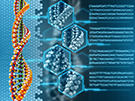
When the human genome was first sequenced, it took ten years and three billion dollars. Since then, the cost has fallen to a few thousand dollars, and companies will soon do it for less than a grand. So, anyone can mail out a tissue sample and in return, get a USB drive with their DNA sequence. But is it really worth it?
One of the great promises of this technology is that one day, doctors will routinely practice personalized medicine ' to identify a person's susceptibility to developing disease, how that disease will progress, and how the person will respond to different types of treatment. Certain genetic disorders are easily predictable, based on the inheritance of a few genetic variances.
For example, inheriting two hemoglobin genetic mutations can cause sickle cell disease. Other examples include muscular dystrophy, hemophilia and Huntington's disease which are among an estimated 4,000 single gene disorders. Genome sequencing will likely identify more of these simple genetic disorders involving one or a few genes.
However, the vast majority of diseases are much more complex, and involve multiple genes and how they influence disease development. As a result, the potential of genome sequencing will be limited until scientists are better able to understand how disease develops.
But even when a genetic test clears someone of a susceptibility to developing certain disease, it's not a free pass because the environment and lifestyle are critical factors. It means their risk is equal to the general population.
While genome sequencing is becoming affordable, there's little a person can do with the information for now. Also, consider how such private information could be misused by insurance companies or potential employers. Always ask about a company's privacy policy before deciding to plunk down the money for a test.
More Information
Identical Twins Usually Don't Die From the Same Thing: The Lost Message About Genes & Disease
From Discover Magazine: "One of the great hopes for genetic medicine is that we will be able to predict which people will develop certain diseases, and then focus preventative measures to those at risk. Scientists have long known that one of the wrinkles in this plan is that we will only rarely be able to say with certainty whether someone develop a given disease based on their genetics'more often, we can only give an estimate of their disease risk."
Cost of Gene Sequencing Falls, Raising Hopes for Medical Advances
From the New York Times: "Complete Genomics, based in Mountain View, is one of more than three dozen firms hastening to push the cost of sequencing an entire human genome below $1,000. The challenge is part biology, part chemistry, part computing, and in Complete Genomics' case, part computer networking."
Cracking the Code of Life [Video]
Program Description from PBS: This two-hour special, hosted by ABC "Nightline" correspondent Robert Krulwich, chronicles the fiercely competitive race to capture one of the biggest scientific prizes ever: the complete letter-by-letter sequence of genetic information that defines human life'the human genome. NOVA tells the story of the genome triumph and its profound implications for medicine and human health.